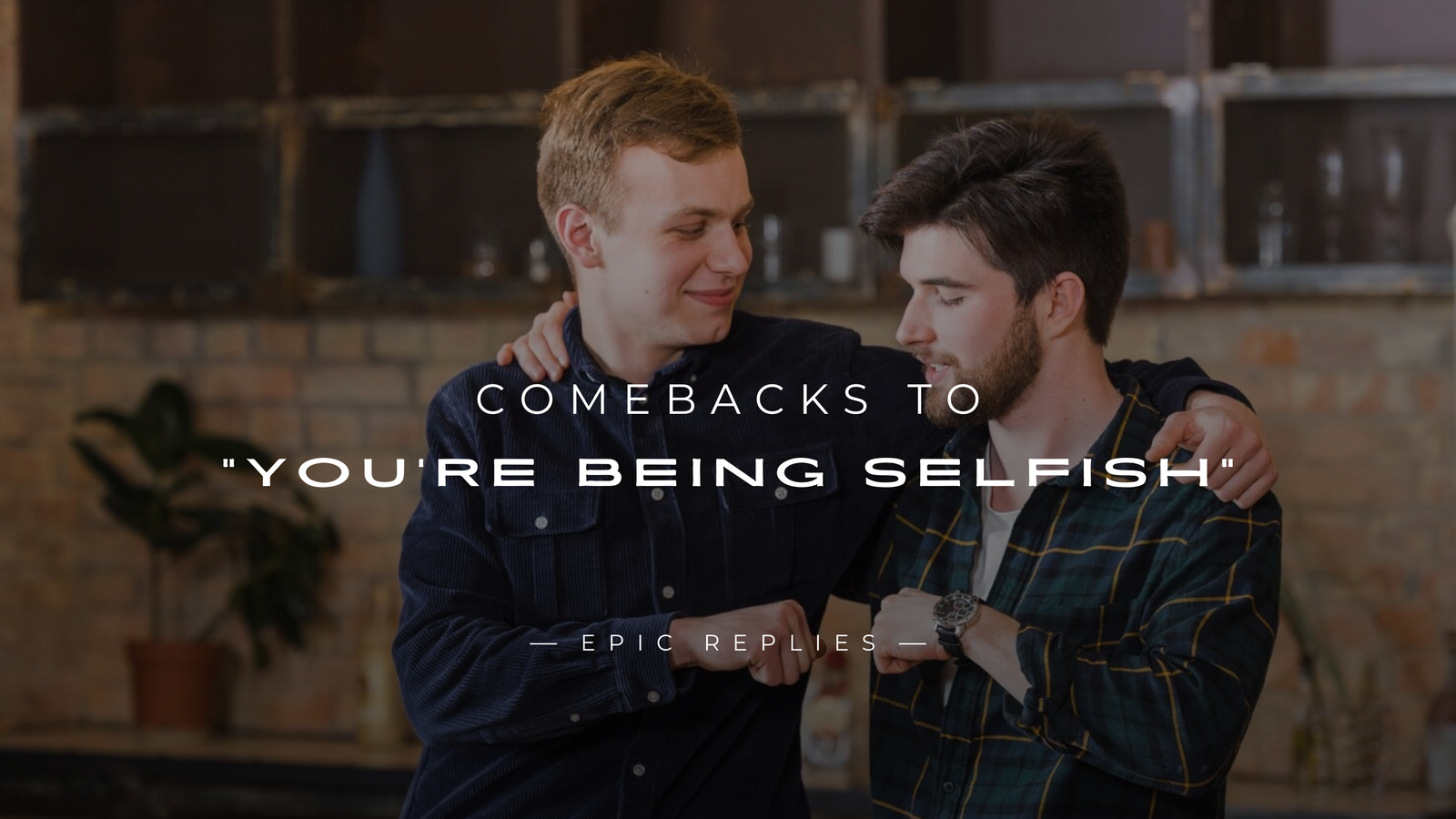Being told “You’re Being Selfish” can feel like a personal attack. It can trigger a mix of guilt, defensiveness, anger, or confusion. These three words carry more than just criticism; they often imply that prioritizing your needs is morally wrong. However, in most situations, being selfish is not the reality. The accusation is usually a reflection of unmet expectations, miscommunication, or an attempt to influence your behavior. Learning how to respond effectively allows you to protect your emotional health, assert your boundaries, and maintain healthy relationships. This guide will provide a comprehensive roadmap for responding to “You’re Being Selfish” in a way that is respectful, assertive, empathetic, and sometimes even humorous.

250+ Comebacks to “You’re Being Selfish”
Clarification Comebacks
- Can you explain what part of this feels selfish to you
- What exactly do you think I am putting ahead of you
- Can you help me understand why my choice bothers you
- What do you mean when you say selfish here
- What outcome are you hoping for from me right now
- Can you clarify what you expected me to do instead
- What makes you feel that my needs are a problem
- How is this action affecting you from your perspective
- Can you point to the specific behavior you mean
- What part of this situation feels unfair to you
Boundary Setting Comebacks
- I hear you but I am allowed to prioritize what I need
- I am taking care of myself and that is valid
- I am setting a limit because it matters to me
- I understand your frustration but my boundary stays
- My needs count too and I am choosing to honor them
- I am not ignoring you I am just respecting my limits
- I am choosing what is right for me right now
- I will not apologize for taking care of myself
- It is important for me to say no here
- I am standing by my decision because it protects my own well being
Humorous Comebacks
- Selfish You should see me when I take the last slice of pizza
- If this is me being selfish imagine my villain arc
- Hold on let me check my Selfish Meter Oh look it is glowing
- If caring about my sanity is selfish then yes I am a pro
- Should I start twirling an imaginary mustache now
- I did not know taking care of myself counted as a crime
- Do I at least get a trophy for being selfish
- Great Now I have to add Selfish to my resume
- If that is the worst thing I am doing I think I am doing fine
- I can be more selfish if you need a comparison chart
Mirror Comebacks
- Interesting You are focusing on me but what are you giving in this situation
- You feel I am being selfish What about your part here
- Why does my choice bother you more than your own needs
- Are you asking me to do something you would do for me
- Why do you think my responsibility is to put your wants first
- Is this about me or about you not getting what you want
- What makes my needs less acceptable than yours
- You say I am selfish Are you acting any differently right now
- Why do my choices trigger you this much
- If the roles were reversed would you still say the same
Reality Check Comebacks
- I am not being selfish I am being honest about my limits
- This is not selfish It is necessary
- I am not choosing myself over you I am choosing what is reasonable
- My decision is based on facts not emotions
- What I am doing is fair even if it is not what you want
- I am not taking anything from you I am protecting my own space
- I am not refusing to help I am simply unable to right now
- You may not like my choice but that does not make it selfish
- This is a practical decision not a personal attack
- I am responding to reality not to guilt
Polite but Firm Comebacks
- I understand how you feel but my decision remains
- I hear you and I am still choosing what is best for me
- Thank you for sharing your view I am keeping mine
- I respect your perspective and I also respect my own
- I am sorry you see it that way but I must stick with my choice
- I appreciate your honesty I need to honor my needs too
- I get where you are coming from yet my answer is still no
- I am not trying to upset you I just have to take care of myself
- Thank you for telling me how you feel but I will proceed as planned
- We can disagree and still be respectful
Empathy Comebacks
- I can see that you are hurt and I am listening
- I hear that this feels unfair to you
- I get that you wanted something different from me
- I understand your frustration even if I cannot change my choice
- I see that my decision affected you more than I realized
- I get that this is disappointing for you
- I can tell that this matters a lot to you
- I understand why you feel this way but I cannot give more right now
- I hear your feelings and I am not ignoring them
- I am taking your emotions seriously even if my answer does not change
Accountability Comebacks
- I understand why it looked that way and I will communicate better
- I see how my action affected you and I will keep that in mind
- You are right that I focused on myself but it was necessary
- I take responsibility for my choice even if it upset you
- I could have explained my reasons more clearly
- I understand the impact I had and I am willing to talk about it
- I accept that my decision had consequences for you
- I can acknowledge your feelings without abandoning my needs
- I own my decision and I stand by it
- I understand your reaction and I am open to discussing it
Defusing Tension Comebacks
- Let us take a breath and talk this through calmly
- I think we are both feeling a bit overwhelmed let us slow down
- We can figure this out without blaming each other
- I want to understand you not fight with you
- Let us reset for a moment
- I do not want this to turn into an argument
- Can we pause and try this conversation again
- I care about you and I want to solve this together
- Let us not jump to conclusions we can talk it out
- We can disagree without attacking each other
Direct Challenge Comebacks
- What makes you think I owe you this
- Why is my choice automatically wrong if it is not what you want
- What exactly are you expecting me to sacrifice
- Why does my having needs bother you so much
- How is doing what is best for me a problem for you
- Why do you believe your wants should come before mine
- What gives you the right to judge my priorities
- Are you upset because I said no or because you assumed I would say yes
- Why does my decision threaten you
- What part of this situation makes you think I am not allowed to choose myself
Boundary Violation Call-Outs
- I need you to respect my limits
- It feels like you are trying to control my choices
- Your comment crosses a boundary I have set
- I am allowed to make decisions for myself
- I need personal space and you are ignoring that
- I am not responsible for managing your expectations
- This conversation is stepping into a line I have drawn
- I expect my choices to be respected
- You are dismissing my boundaries and that is not okay
- I cannot accept pressure to compromise my limits
Values-Based Comebacks
- I make choices that align with my principles
- My decisions are based on what I believe is right
- I prioritize honesty and self-respect over convenience
- I act according to my values not just to please others
- I am guided by what I stand for not by fear of judgment
- I believe taking care of myself is ethical
- My actions reflect the standards I live by
- I value fairness and that means honoring my own needs
- I choose integrity over convenience
- I am committed to doing what aligns with my morals
Self-Respect Comebacks
- I will not apologize for taking care of myself
- My self-respect is important and I will protect it
- I have a right to prioritize my well being
- I am not selfish for valuing myself
- I will stand by my choices with dignity
- Respecting myself is not negotiable
- I honor my own needs without guilt
- I am allowed to say no
- I choose my well being over pleasing everyone
- I will not compromise my self-worth
Reframing Comebacks
- I am not being selfish I am being responsible
- This is not me ignoring you it is me taking care of myself
- I am choosing what is necessary for balance
- My decision protects both of us in the long run
- I am prioritizing what will keep things sustainable
- I am making a choice that prevents bigger problems
- This is about self-care not selfishness
- I am ensuring my energy is where it matters most
- I am acting thoughtfully not selfishly
- This decision benefits more than just me
Humbling Comebacks
- Believe me if I were really selfish you would notice
- I have done a lot for others I can afford to care for myself now
- I am far from perfect but this is reasonable
- I do not claim to always be selfless
- My choices are human and limited
- I try to help where I can and still need boundaries
- I am not the villain in this situation
- I am doing my best without overstepping
- I can acknowledge your needs and still choose mine
- Let us not exaggerate my intentions
Logical Comebacks
- Prioritizing my needs does not cancel out caring for you
- Saying no when necessary prevents resentment later
- Self-care ensures I can support others effectively
- I am making a rational decision for my well being
- Your claim does not change the facts of my limits
- Being honest about what I can do is not selfish
- This is a practical choice not a moral failing
- My needs exist independent of your expectations
- It is logically consistent for me to act in my best interest
- Doing what is reasonable does not equate to selfishness
Redirecting Comebacks
- Let us focus on solving the issue instead of blaming
- Can we talk about the actual problem rather than my motives
- I want to find a solution not get accused
- Let us shift from blame to action
- What can we do to resolve this situation together
- I hear you but let us discuss outcomes
- Let us work on understanding each other rather than labeling
- I want to redirect this energy toward fixing the issue
- Let us focus on what can be done rather than assigning fault
- Let us move from judgment to problem-solving
Jokingly Over-the-Top Comebacks
- Oh no I am the villain in your story how dramatic
- Alert the media I am selfish again
- Quick someone write this down I am officially selfish today
- Call the superheroes I am ruining the world with my selfishness
- Hold the presses my selfishness knows no bounds
- I better start practicing my evil laugh
- Someone get me a crown for Supreme Selfishness
- I am taking self-care to a whole new level
- Watch out world my selfishness is on fire
- Should I add a cape to my selfish costume
Calling Out Manipulation Comebacks
- It feels like you are trying to make me feel guilty
- I see the pressure you are putting on me and it is not fair
- Your words seem more about control than concern
- I am aware of the guilt trip and I will not engage
- You are trying to manipulate my choice and I will not let that happen
- I notice you are twisting this to make me feel bad
- I will make my decision independent of your pressure
- I am not responding to attempts to control me
- I see what you are doing and it is not acceptable
- I will not be manipulated into ignoring my needs
Minimalist Comebacks
- No
- Noted
- I disagree
- That is your view
- I am fine
- I said no
- Okay
- I choose myself
- I understand
- Done
Powerful Silence Comebacks
- [Remain silent and maintain eye contact]
- [Slow nod without speaking]
- [Smile calmly and stay quiet]
- [Cross arms and let the moment speak]
- [Pause for a few seconds before walking away]
- [Maintain composure without answering]
- [Quiet acknowledgment without engagement]
- [Step back and let silence carry the message]
- [Let your expression communicate firmness]
- [No words needed, just presence]
Assertive “No” Comebacks
- No I will not compromise my needs
- No I cannot do that right now
- No I have to prioritize myself
- No my decision stands
- No I will not apologize for saying no
- No this is not negotiable
- No I am choosing what is best for me
- No my boundary is firm
- No I will not give in to pressure
- No I will take care of myself first
Playful Mock-Agreement Comebacks
- Oh yes I am the selfish queen today
- Totally guilty of being selfish, what a scandal
- You caught me I am selfish and proud
- Absolutely I put myself first like a pro
- I confess yes selfishness is my superpower
- Guilty as charged I will not deny it
- Yes I am selfish now can I get a medal
- Selfish and loving it that is my motto
- I am selfish and my cape is invisible
- I admit it I am selfish let us celebrate
Honesty-Based Comebacks
- I am being honest about what I need right now
- My choice is about self-care not selfishness
- I am setting a boundary because it is necessary
- I am prioritizing my well being openly
- I am truthful about my limits
- I cannot pretend my needs do not exist
- I am transparent about my decision
- I am acting from honesty not selfishness
- I need to be clear about my priorities
- I am straightforward about what I can and cannot do
Conflict-Ending Comebacks
- We are done here
- Let us agree to disagree
- I will not continue this argument
- This conversation ends now
- I am choosing peace over this fight
- There is nothing more to discuss
- Let us move on
- I will step away from this conflict
- The discussion is over
- I am closing this topic
Why Hearing “You’re Being Selfish” Feels So Intense
- Childhood Messages About Sharing and Approval
Most of us grew up with rules like share your toys, put others first, and never think only about yourself. These messages were designed to encourage empathy and cooperation, but they also created a strong association between approval and selflessness. When someone tells you “You’re Being Selfish”, it triggers these internalized childhood lessons, making you feel like you are failing a basic moral test. Even as adults, these early experiences can make us react with guilt, shame, or defensiveness.
- Labels Shortcut Complex Reality
Calling someone selfish reduces a complicated interaction to a simple label. Relationships often involve multiple needs, conflicting priorities, and miscommunication. The phrase “You’re Being Selfish” oversimplifies these dynamics and pushes the conversation toward blame rather than understanding. Recognizing this gives you a chance to respond thoughtfully instead of reacting emotionally.
- Guilt Versus Accountability
There is a key difference between guilt and accountability. Guilt makes you feel bad for prioritizing your needs or protecting your boundaries. Accountability, on the other hand, is constructive and encourages reflection on how your actions impact others. When responding to “You’re Being Selfish”, your goal should be to maintain accountability without succumbing to unnecessary guilt.
What People Really Mean When They Say “You’re Being Selfish”
- They Feel Unheard or Ignored
Often, when someone says “You’re Being Selfish”, they are expressing feelings of being dismissed or invisible. The accusation is sometimes a shortcut for “I feel overlooked or unimportant.” Understanding this helps you respond with empathy while protecting your own emotional space.
- They Want a Specific Outcome
Many accusations of selfishness stem from unmet expectations. When your actions or decisions do not align with what the other person wants, frustration can turn into blame. Recognizing this dynamic allows you to respond without internalizing unnecessary guilt and assert your own needs.
- They Are Using Emotion to Influence Behavior
In some cases, the phrase “You’re Being Selfish” is used as a manipulative tactic. It leverages guilt or shame to control your decisions. Repeated patterns of this type of accusation may indicate that the other person is attempting to influence your behavior rather than address a real concern. Recognizing these patterns helps you respond strategically and protect your boundaries.
How to Pause and Assess Before Responding
- Quick Emotional Check
When you hear “You’re Being Selfish”, pause for a moment and perform a mental check. Ask yourself:
- Am I emotionally calm enough to respond thoughtfully?
- Am I safe in this environment physically and emotionally?
- What is my goal in this interaction repair, boundary, or disengage?
Even a few seconds of reflection can prevent a reactive response that escalates conflict.
- Ask Clarifying Questions
Transforming an accusation into a question shifts the focus from blame to understanding. Examples include:
- “Can you help me understand what specifically feels selfish to you?”
- “Which part of my behavior seems selfish from your perspective?”
This approach encourages dialogue and helps uncover the underlying issue rather than escalating defensiveness.
- Decide Your Goal for the Interaction
Before responding, decide your objective:
- Repair the relationship
- Assert personal boundaries
- Disengage from a toxic interaction
Your goal will determine whether you respond with curiosity, assertiveness, humor, or strategic silence.
Conversation Templates That Defuse and Invite Dialogue
- Curiosity First Template
Say: “I want to understand. Can you tell me exactly what feels selfish so I can see it from your perspective?”
This approach invites specificity and turns the conversation into problem-solving rather than a blame game.
- Needs and Boundaries Template
Say: “I hear that you are upset. Right now, I need X. Let’s find a way to meet both our needs.”
This shows empathy while asserting your boundaries clearly and without guilt.
- Repair and Reflect Template
Say: “I am sorry you felt hurt. What can I do to make this better and prevent it from happening again?”
This shifts the conversation from blame to collaborative problem-solving, showing maturity and emotional intelligence.
Respectful Comebacks That Maintain Relationships
- “Can you tell me what feels selfish to you?”
This question transforms a blanket accusation into a specific discussion. It forces the accuser to clarify their point, which can reduce the power of vague labeling.
- “I want to understand. Help me see your side.”
Expressing curiosity and empathy disarms defensiveness and encourages constructive dialogue.
- “I hear you. Let us find a solution together.”
Focusing on solutions rather than blame signals maturity, cooperation, and willingness to engage without compromising boundaries.
Assertive Comebacks That Protect Your Boundaries
- “My choice is about my wellbeing, not about hurting you.”
Separates your intention from their perception, allowing you to maintain your boundaries without hostility.
- “I am choosing what I need right now.”
Short, firm, and non-argumentative. This communicates your decision clearly without apologizing or overexplaining.
- “Taking care of myself is not the same as taking from you.”
This line clarifies that self-care is not selfishness, addressing guilt-tripping or manipulative interpretations of your actions.
Responses for Manipulative or Toxic Situations
- Recognize Patterns of Guilt
If accusations of selfishness appear every time you set boundaries, it may indicate emotional manipulation. Recognizing the pattern allows you to respond strategically rather than emotionally.
- “I will not accept guilt to get compliance.”
A calm, assertive statement that sets a firm boundary while maintaining composure.
- Use Exit Lines to Preserve Safety
When the situation escalates, you can say: “I am stepping away until we can speak respectfully.” Walking away preserves your emotional well-being and prevents escalation.
Using Humor to Defuse Without Dismissing
- Light Lines That Lower Tension
In low-stakes situations, humor can diffuse tension:
- “Selfish? I am just on a self-preservation plan.”
- “I am not selfish, I am a limited edition me.”
Humor can lighten the mood without minimizing the other person’s feelings if used appropriately.
- When Humor Works and When It Does Not
Humor should never dismiss genuine feelings. It is most effective in casual or low-intensity disagreements and can make the conversation easier to navigate. Avoid humor if emotions are raw or serious.
Spoken and Written Comebacks for Different Settings
- At Work
Written: “I want to clarify priorities so I can manage expectations. Setting these limits is about productivity, not being selfish.”
Spoken: “I understand this is urgent. Here is what I can realistically manage right now.”
Professional responses should remain neutral, factual, and documented to avoid misunderstandings.
- With Family
Say: “I know you care. I also need to make this choice for my wellbeing.”
Family interactions are often emotionally charged. Combining empathy with firm boundaries prevents resentment while maintaining connection.
- With Friends and Partners
Say: “I love you and I also need space. Both can be true at the same time.”
Using relational language acknowledges connection while asserting your needs, keeping the relationship healthy and balanced.
When the Accusation Is Accurate and How to Respond
Genuine Reflection
If your actions genuinely hurt someone, acknowledge it openly: “You are right. I did not consider how this would affect you, and I am sorry.”
Reflection demonstrates self-awareness and prevents defensiveness.
Apologize While Maintaining Boundaries
Structure your apology:
- Acknowledge the impact
- Take responsibility for your part
- Offer repair or corrective action
- Restate ongoing boundaries
Example: “I am sorry I prioritized my plans over your event. I will make time next week. I still need Saturday mornings for rest.”
Learn and Change Patterns
After apologizing, discuss recurring patterns and expectations. Set clear intentions and agreements for healthier communication in the future.
Practicing Long-Term Communication Skills
- Using I Statements
Replace accusatory “you” statements with “I” statements to reduce conflict.
Example: Instead of “You are being selfish,” say “I feel hurt when my needs are not considered.”
- Ask for Needs Without Shame
State your needs clearly and respectfully: “I need rest tonight. Will you manage dinner today?”
Direct communication reduces guilt and prevents misunderstandings.
- Spot Emotional Manipulation Early
Signs include:
- Repeated labeling such as “You’re selfish” or “You never”
- Guilt-based demands referencing past favors
- Escalation when you say no
Recognizing these patterns allows proactive boundary-setting and prevents emotional burnout.
Conclusion
Handling someone who accuses you of being selfish doesn’t have to be stressful. With these 250+ comebacks, you now have a variety of witty, clever, and even humorous ways to respond, whether you want to lighten the mood or assert yourself confidently. Remember, the key to a perfect comeback is knowing your audience and staying true to your style. And if you enjoyed these responses, be sure to check out our other compilation: 250+ Best Comebacks to “Why Don’t You Smile More?” for even more clever ways to handle everyday comments with flair.
FAQS
Q. What is the best immediate response to “You’re Being Selfish”
A simple response is “Can you tell me what feels selfish to you?” This invites clarity and reduces the power of vague accusations.
Q. How do I know if I am genuinely being selfish
Reflect on your motivations and impact. Prioritizing self-care is not selfish. Ignoring others’ needs consistently may indicate selfish behavior.
Q. How do I respond if someone says “You’re Being Selfish”
Yes, in low-stakes situations. Humor can lighten tension without dismissing feelings. Avoid humor if emotions are serious or intense.
Q. How do I apologize without losing my boundaries
Acknowledge the impact, offer repair, and restate limits: “I am sorry I hurt you by not showing up. I will make time next week. I still need Saturday mornings for rest.”










